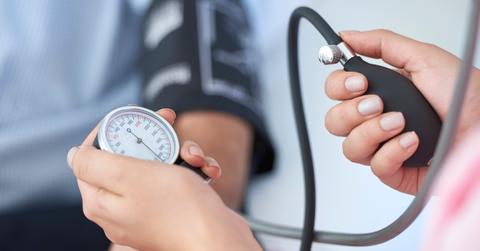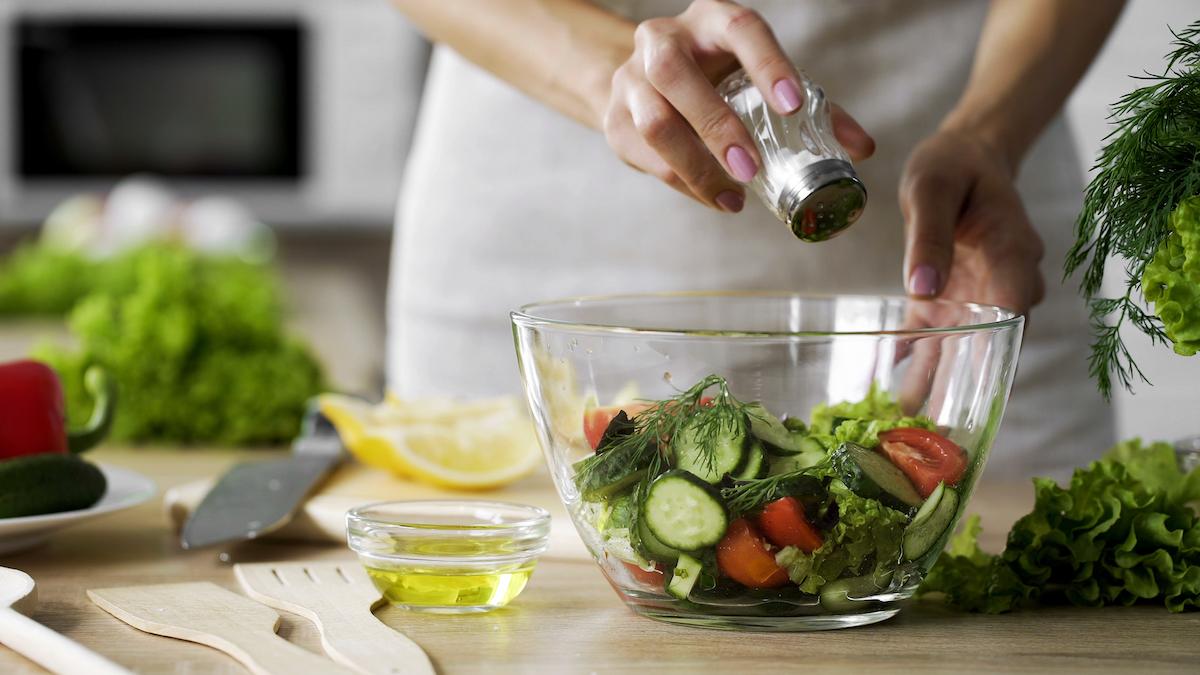Natural Remedies for High Blood Pressure
A few lifestyle changes can make a huge difference.
Updated Oct. 21 2019, 10:02 a.m. ET

While many doctors will prescribe medication to help patients suffering from high blood pressure (and those medications can be very effective), they tend to come with side effects. So in pursuit of avoiding less-than-pleasant side effects, many people have found success in natural remedies. And we’re not talking about natural remedies based on anecdotal evidence, like drinking funky tea or getting into meditation — we’re talking about simple changes to your lifestyle and diet.
Interestingly, high blood pressure typically shows no signs or symptoms, earning it the not-so-cheerful nickname of the “silent killer.” But if you or someone you know has been diagnosed with high blood pressure, there’s no reason to panic just yet. Read on for everything you need to know about high blood pressure and how to naturally manage the condition, which affects about 75 million adults in the U.S. — that’s around 1 in 3 adults, according to the Centers for Disease Control and Prevention.
What Is High Blood Pressure?
High blood pressure, also known as hypertension, is when the blood pressure in your arteries (the force of blood pushing against blood vessel walls) is higher than it should be, according to the American Heart Association. As mentioned above, high blood pressure does not usually show any clear-cut symptoms, but it can lead to a heart attack (the No. 1 cause of death in the U.S.), stroke (No. 3), type 2 diabetes (No. 7), kidney failure, and aneurysms.
What Causes High Blood Pressure?
According to Dr. Michael Greger of NutritionFacts.org, high cholesterol, which is typically caused by eating meat, dairy, and eggs, is the primary cause of high blood pressure. Other factors include: being overweight, too much sodium, smoking tobacco, drinking too much alcohol, drinking too much caffeine, not exercising enough, and having high stress levels, according to the Mayo Clinic.
Natural Remedies for Lowering High Blood Pressure
The most effective ways to naturally lower high blood pressure is by changing up your diet and lifestyle. But first, the most important step is to see a doctor, and have your blood pressure measured. Talk with your doctor to see if some of the natural remedies listed below could be effective for you. It's important to keep your doctor in the loop, because your medication levels may need to be adjusted after making any of the following lifestyle changes.
Here are a few ways to naturally manage your blood pressure.
Eat More Plant-Based Meals
Earlier this year, Green Matters interviewed lifestyle medicine physician Dr. Sapana Shah from NYC Health + Hospitals/Bellevue's Plant-Based Lifestyle Medicine Program. Based on a wealth of scientific studies, the team developed a program encouraging patients suffering from high blood pressure (as well as type 2 diabetes, pre-diabetes, high cholesterol, obesity, or heart disease) to eat a plant-based diet, with a focus on “whole foods,” which means foods in their original form, free of processing or refining. That includes fruits, vegetables, leafy greens, whole grains, nuts, seeds, and beans; the diet also limits one’s intake of refined grains, sugar, and oil.
While that may sound limiting at first, there are still so many yummy foods you can eat while being plant-based, with the added benefit of lowering your environmental impact and hurting less animals. For meal ideas, Dr. Shah recommends checking out The How Not to Die Cookbook by Dr. Michael Greger of NutritionFacts.org.
Interestingly, plant foods do not contain any cholesterol. Animal products (meat, fish, dairy, and eggs) are the only foods that contain cholesterol, and eating those products therefore increases human cholesterol levels. According to the Cleveland Clinic, high cholesterol can cause high blood pressure — so removing animal products from your diet can naturally help maintain a healthy cholesterol level and therefore a healthy blood pressure.
As Dr. Shah told Green Matters, switching to a plant-based diet can help patients curb high blood pressure or other conditions relatively quickly. “If they're on any medications for diabetes or high blood pressure, we [will see them again] within two to four weeks [after their initial visit] to make sure the medications don't need to be adjusted, because we definitely don't want someone to become hypoglycemic or [have] too low of a blood pressure," she told us. Following that logic, make sure to have your doctor check your blood pressure shortly after making a big change like switching to eating plant-based.
If you do not feel ready yet to transition to a fully plant-based diet, Dr. Shah recommends incorporating as many plant-based meals and snacks into your diet as possible, watching the documentaries Forks Over Knives and What the Health, and signing up for a free vegan challenge, such as the 21-Day Vegan Kickstart.
Reduce Your Sodium Intake

Many doctors tell patients with high blood pressure to reduce their intake of sodium and salt. As explained by Blood Pressure UK, eating too much sodium can cause the muscles of your artery walls to become stronger and thicker, meaning there is less space in the arteries, therefore further raising your blood pressure. Make sure to discuss your recommended maximum daily intake of sodium with your doctor.
Interestingly, the American Heart Association has found that up to 75 percent of the sodium we eat is hidden in processed foods, including packaged pizzas, meat, cheese, and soup. So for that reason, simply eliminating table salt and kosher salt from your home kitchen may not be enough to keep your sodium levels healthy while living with high blood pressure. Start checking the nutrition facts of packaged meals and snacks, and focus on eating whole plant foods, which are typically lower in sodium than foods like meat and cheese. And to make your home cooking more flavorful without adding salt, try using spices, nutritional yeast, vinegar, lemon juice, or lime juice.
Exercise to Lose Weight and Lower Your Blood Pressure

According to the Mayo Clinic, regular physical activity for 30 minutes most days of the week can significantly lower your blood pressure. Not only that, but exercising (especially combined with a healthy plant-based diet) can also help you lose weight, which can also help lower blood pressure.
The type of exercise you do is up to you, but the Mayo Clinic recommends aerobic exercises that will get your heart rate up, such as walking, jogging, or running, swimming, cycling, or dancing. To get more bang for your buck, the Mayo Clinic suggests HIIT (high-intensity interval training) workouts for those who are able to do them. HIIT involves alternating between intensely exercising and light recovery exercises, and a ScienceDirect study found that HIIT can improve resting blood pressure while maintaining heart function.
Cut Back On Alcohol, Caffeine, and Cigarettes

If you regularly drink alcohol, consume caffeine, or smoke cigarettes, consider trying to quit.
According to the Mayo Clinic, every time you smoke one cigarette, your blood pressure rises. A study published on NCBI attributes this to the tobacco and nicotine in cigarettes, which increases cardiac output, and immediately causes a rise in blood pressure. Smokefree.gov can provide you with free resources for quitting cigarettes.
In terms of alcohol, the American Heart Association asserts that regularly drinking alcohol can “dramatically” raise blood pressure, as well as lead to heart failure, irregular heartbeats, stroke, obesity, alcoholism, and more. If you or someone you know is looking for guidance with quitting drinking alcohol, visit Alcohol.org or call their hotline at 866-900-4632 for free support.
The research on how caffeine affects blood pressure isn’t as clear cut. According to an article published by Harvard Medical School, drinking coffee or other caffeinated beverages can immediately raise one’s blood pressure, and that’s why doctors often tell patients not to drink any before getting their blood pressure checked. However, Harvard noted that while many studies have found that drinking caffeine can raise blood pressure, other studies have found that coffee does not significantly affect blood pressure — so if you are a caffeine-drinker, make sure to talk to your doctor.